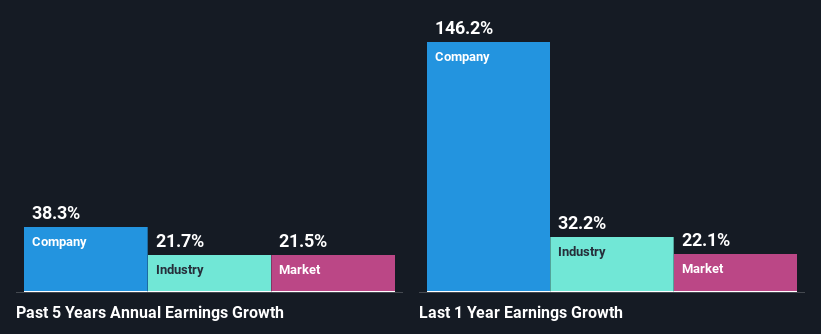JSW Infrastructure (NSE:JSWINFRA) has had a great run on the share market with its stock up by a significant 18% over the last three months. Given that the market rewards strong financials in the long-term, we wonder if that is the case in this instance. In this article, we decided to focus on JSW Infrastructure’s ROE.
Return on equity or ROE is a key measure used to assess how efficiently a company’s management is utilizing the company’s capital. Put another way, it reveals the company’s success at turning shareholder investments into profits.
See our latest analysis for JSW Infrastructure
How Is ROE Calculated?
Return on equity can be calculated by using the formula:
Return on Equity = Net Profit (from continuing operations) ÷ Shareholders’ Equity
So, based on the above formula, the ROE for JSW Infrastructure is:
15% = ₹11b ÷ ₹74b (Based on the trailing twelve months to December 2023).
The ‘return’ is the income the business earned over the last year. That means that for every ₹1 worth of shareholders’ equity, the company generated ₹0.15 in profit.
Why Is ROE Important For Earnings Growth?
Thus far, we have learned that ROE measures how efficiently a company is generating its profits. Depending on how much of these profits the company reinvests or “retains”, and how effectively it does so, we are then able to assess a company’s earnings growth potential. Generally speaking, other things being equal, firms with a high return on equity and profit retention, have a higher growth rate than firms that don’t share these attributes.
JSW Infrastructure’s Earnings Growth And 15% ROE
To start with, JSW Infrastructure’s ROE looks acceptable. And on comparing with the industry, we found that the the average industry ROE is similar at 15%. This probably goes some way in explaining JSW Infrastructure’s significant 38% net income growth over the past five years amongst other factors. However, there could also be other drivers behind this growth. For example, it is possible that the company’s management has made some good strategic decisions, or that the company has a low payout ratio.
As a next step, we compared JSW Infrastructure’s net income growth with the industry, and pleasingly, we found that the growth seen by the company is higher than the average industry growth of 22%.

Earnings growth is a huge factor in stock valuation. What investors need to determine next is if the expected earnings growth, or the lack of it, is already built into the share price. By doing so, they will have an idea if the stock is headed into clear blue waters or if swampy waters await. Is JSW Infrastructure fairly valued compared to other companies? These 3 valuation measures might help you decide.
Is JSW Infrastructure Efficiently Re-investing Its Profits?
JSW Infrastructure doesn’t pay any dividend to its shareholders, meaning that the company has been reinvesting all of its profits into the business. This is likely what’s driving the high earnings growth number discussed above.
Conclusion
On the whole, we feel that JSW Infrastructure’s performance has been quite good. In particular, it’s great to see that the company is investing heavily into its business and along with a high rate of return, that has resulted in a sizeable growth in its earnings. That being so, a study of the latest analyst forecasts show that the company is expected to see a slowdown in its future earnings growth. To know more about the company’s future earnings growth forecasts take a look at this free report on analyst forecasts for the company to find out more.
Valuation is complex, but we’re helping make it simple.
Find out whether JSW Infrastructure is potentially over or undervalued by checking out our comprehensive analysis, which includes fair value estimates, risks and warnings, dividends, insider transactions and financial health.
Have feedback on this article? Concerned about the content? Get in touch with us directly. Alternatively, email editorial-team (at) simplywallst.com.
This article by Simply Wall St is general in nature. We provide commentary based on historical data and analyst forecasts only using an unbiased methodology and our articles are not intended to be financial advice. It does not constitute a recommendation to buy or sell any stock, and does not take account of your objectives, or your financial situation. We aim to bring you long-term focused analysis driven by fundamental data. Note that our analysis may not factor in the latest price-sensitive company announcements or qualitative material. Simply Wall St has no position in any stocks mentioned.

